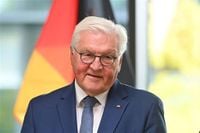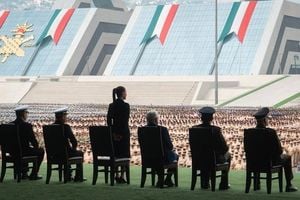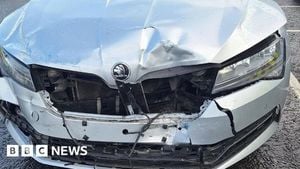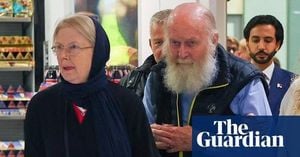As the world marked the Jewish New Year on September 22, 2025, a complex tapestry of memory, activism, and warning unfolded across Europe and beyond. At the heart of this moment stood two voices—one personal, one presidential—each grappling with the legacy of genocide, the meaning of remembrance, and the urgent realities of present-day conflict and prejudice.
For one activist, the season began not with celebration but with a difficult decision. Driving home from the People’s Conference for Palestine in Detroit, she received an invitation from family in Prague to attend a Stolpersteine placement ceremony—one of those poignant moments when a small brass plaque is set into the pavement, marking the last voluntary residence of a victim of the Nazi genocide. This particular Stolpersteine was commissioned by the daughter of her grandmother’s cousin, in memory of the grandparents she never knew, who, like so many others, were swept away by the machinery of Nazi terror. The author had come to know these lost relatives—her great-grandmother’s brother and his wife—through years of translating family letters from Nazi-occupied Prague. Their lives, once urban and middle-class, were shattered by forced displacement, loss of income, and the ever-tightening restrictions imposed by the occupiers. Eventually, they were deported to a ghetto camp and then shipped to killing sites in Poland and Belarus, a fate shared by most of her family.
“I grew up under the weight of this genocide which everyone referred to as ‘The Holocaust,’” she recalled. Yet, as she reflected, her experience was always at some remove. Her grandparents and father had been among the lucky few to escape, and the trauma was rarely discussed at home. Her grandmother’s cousin, “J,” survived a labor camp and returned to Prague after the war, eventually starting a family. Decades later, his daughter would honor the grandparents she never met with the Stolpersteine ceremony.
But the invitation came at a time when the author’s focus had shifted entirely. For nearly two years, she had been immersed in activism against what she described as Israel’s ongoing genocide of Palestinians in Gaza and the West Bank. The destruction of Palestinian homes, hospitals, schools, and cultural heritage—actions she called a “livestreamed genocide”—weighed heavily on her conscience. The idea of traveling to Prague, of celebrating family togetherness in the shadow of what she saw as another unfolding atrocity, felt impossible. “Every day I honor the memory of our family killed in the Nazi genocide by working for an end to Israel’s genocide of Palestinians,” she wrote to her cousin, declining the invitation. “Israel is committing this genocide in the name of our family and all Jews. It is another holocaust. I believe if my grandmother was alive today, she would be protesting in the streets along with me.”
The exchange laid bare a painful rift. Her cousin’s response was brief: “I support Israel.” After a further attempt at dialogue—sharing an interview with a Holocaust survivor who condemned Israeli actions—communication between them ceased for over a year. When the Stolpersteine invitation arrived eighteen months later, the chasm between their perspectives had only widened, deepened by the relentless violence in Gaza and the author’s growing sense of personal loss and purpose.
The author drew explicit parallels between Nazi genocidal rhetoric and current Israeli policies, emphasizing that, for her, Palestinian resistance—including armed struggle—was as legitimate as the Jewish resistance in the Warsaw Ghetto or the revolt at Treblinka, where her own great-grandparents perished. She lamented the normalization of what she viewed as apartheid and ethnic cleansing, arguing that Western societies too often failed to recognize the ongoing nature of Palestinian suffering—a suffering she believed was rooted in the founding of the Israeli state and the displacement of indigenous Palestinians.
She described the emotional toll of her activism: the inability to connect with those who did not share her sense of urgency about Palestine, the loss of friends and even family, and the clarity and determination she found in standing with others who shared her convictions. “What keeps us going is each other. Palestine will be free,” she concluded, framing her activism as both a tribute to her murdered ancestors and a refusal to let their memory be used to justify present-day oppression.
Meanwhile, in Berlin, German Federal President Frank-Walter Steinmeier addressed the Jewish communities of Germany with a message that echoed across the continent. In his New Year greetings, published on September 21, 2025, Steinmeier expressed his deep concern about the resurgence of antisemitism in Germany. “Hatred of Jews and hostility to others must never be allowed to become normalised,” he warned, underscoring the dangerous persistence of old prejudices in new forms.
Steinmeier took the occasion to honor Margot Friedländer, a Holocaust survivor who died in Berlin on May 9, 2025, at the age of 103. Friedländer, he said, had been a role model in her commitment to tolerance, democracy, and humanity—a living reminder of both the horrors of the past and the possibility of building a better future. His message was clear: remembrance is not merely about looking back, but about shaping the present and future, ensuring that the lessons of the Holocaust are not lost to complacency or indifference.
The juxtaposition of these two voices—one personal, anguished, and activist; the other official, solemn, and warning—captures the enduring complexity of memory in a world still riven by violence and hate. For the activist, the legacy of the Holocaust is inseparable from her commitment to justice for Palestinians. For Steinmeier, the memory of genocide demands vigilance against all forms of hatred and the defense of democratic values.
Both, in their own ways, refuse to let the past be used as a shield for injustice or as an excuse for forgetting. As the Jewish New Year dawned, their words served as a reminder that the work of remembrance is never done—and that, in the face of rising hatred and ongoing conflict, it remains as urgent as ever.




